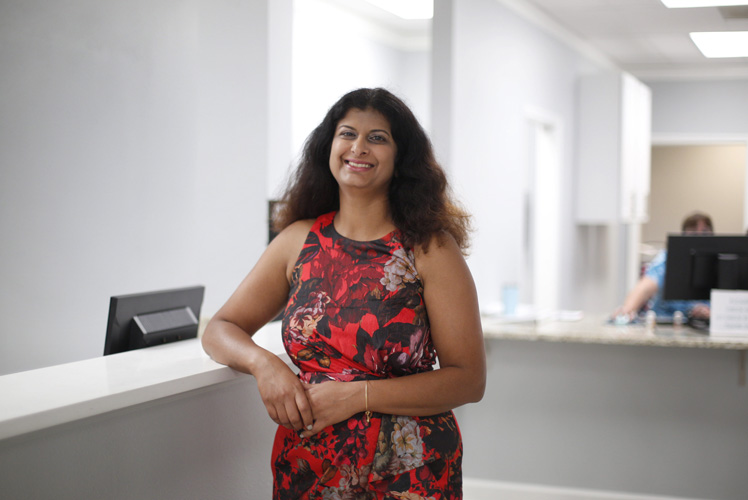
Treating pain is big business.
Nearly one-third of U.S. residents suffer from some form of chronic pain, according to the Institute of Medicine at the National Academy of Sciences.
In the face of that statistic, Dr. Alita Sikora has been working in Vero Beach for more than 10 years to develop better ways of treating chronic pain than, as she puts it, simply writing opioid prescriptions.
As the dangers of opioids have become more well know, her practice, Sikora Regenerative Medicine, has grown to the point that she recently moved to a new, much larger office.
“We’re going to have three times the space, and I’ve added a part-time nurse practitioner and a physician assistant to the practice,” Sikora says.
So, what exactly is “regenerative medicine?”
That’s the right question to ask but a tricky one to answer.
Sikora says that to her, “regenerative medicine is the study of how to heal the body – not just mask problems with cortisone shots or medications [like opioids], but actually have the body heal and repair itself.”
It is a growing and widely accepted aspect of modern medicine. According to an article published by the Proceedings of the National Academy of Sciences, “regenerative medicine has the potential to heal or replace tissues and organs damaged by age, disease, or trauma, as well as to normalize congenital defects. Promising preclinical and clinical data to date support the possibility for treating both chronic diseases and acute insults, and for regenerative medicine to abet maladies occurring across a wide array of organ systems and contexts, including dermal wounds, cardiovascular diseases and traumas, treatments for certain types of cancer, and more.”
The Mayo Clinic says integrative medicine, which regenerative medicine is part of, “can help people with cancer, persistent pain, chronic fatigue, fibromyalgia and many other conditions better manage their symptoms and improve their quality of life by reducing fatigue, pain and anxiety.”
The use of stem cell therapy is sometimes employed as part of regenerative medicine and Dr. Sikora plans to offer the therapy in the near future.
“Stem cells are special human cells that have the ability to develop into many different cell types, from muscle cells to brain cells,” according to Stanford Children’s Health. “In some cases, they also have the ability to repair damaged tissues. Researchers believe that stem cell-based therapies may one day be used to treat devastating ailments like paralysis and Alzheimer’s disease.”
However, according to the U.S. Food and Drug Administration, that “one day” hasn’t arrived yet. The agency cautions that the therapy is no cure-all: “Stem cells have been called everything from cure-alls to miracle treatments. But don’t believe the hype.”
The only stem cell-based products currently FDA-approved for use in the United States consist of blood-forming stem cells (hematopoietic progenitor cells) derived from cord blood. These products are approved for limited use in patients with disorders that affect the body system that is involved in the production of blood.
That’s not knee pain. It’s not paralysis. It’s not Alzheimer’s disease.
As Sikora explains, “there are some clinics in the state, not run by doctors,” that offer stem-cell therapy indiscriminately, “so the state is going after these kinds of bad players.”
It is a caveat emptor – or buyer beware – situation.
Still, as Sikora puts it, “I have patients who have failed every traditional treatment. I have people that have failed multiple surgeries, failed with opioids. They’ve tried the whole gamut,” without success.
For those patients, Sikora’s medically-supervised regenerative techniques and therapies – medical marijuana, bio-identical hormones, soft wave or sound wave therapy, IV vitamin drips, massage therapy, acupuncture and platelet-rich plasma injections, as well as stem cell therapy – may offer relief from chronic pain. However, if you’re considering any type of regenerative medicine as an alternative health or pain relief path, you need to ask detailed questions. Consult your primary care physician about which questions you should ask before agreeing to any treatments and find out what your out-of-pocket costs will be, as some treatments are not be covered by insurance.
Dr. Alita Sikora’s ‘Sikora Regenerative Medicine’ is now at 1255 37th Street at the corner of 37th and Dr. Hugh McCrystal Drive. The phone number is 772-228-6882.



